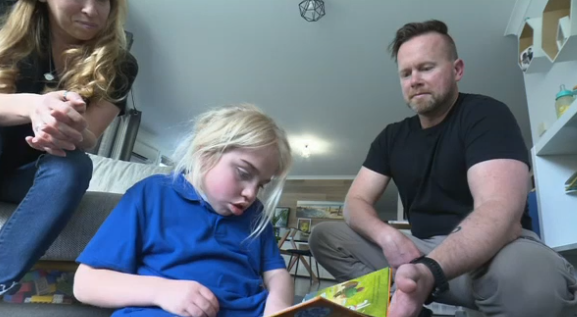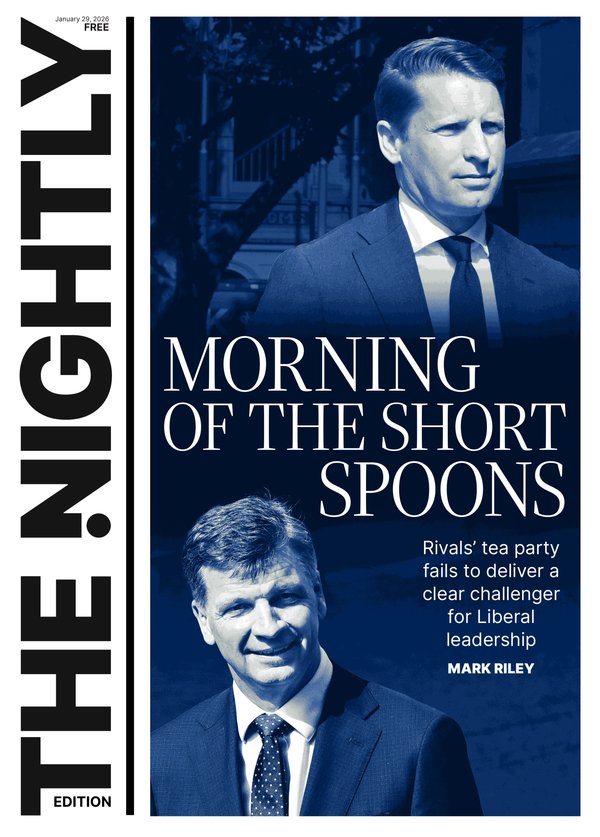Australian families call for urgent action on childhood dementia
A devastating but little known health crisis is gripping Australian families — childhood dementia.
It affects as many children as cancer, but with no treatments, no cure, and little public awareness, parents are left fighting not only the disease, but also a system that isn’t equipped to help.
Megan Maack, CEO of the Childhood Dementia Initiative, says most Australians have never even heard of childhood dementia despite its devastating toll.
Sign up to The Nightly's newsletters.
Get the first look at the digital newspaper, curated daily stories and breaking headlines delivered to your inbox.
By continuing you agree to our Terms and Privacy Policy.“Most people don’t know about childhood dementia, but it’s a devastating reality for thousands of families around Australia,” she said.
“A baby is born every three days in Australia from a condition that will cause dementia in childhood and probably the easiest way to describe it is progressive brain damage.
“Babies are born seemingly healthy and they hit all of their early milestones… At some point the development slows, it plateaus and then it regresses and unfortunately these children lose all of the skills that they’ve once developed.”
She said the health system is failing these children.

“We’re in this situation where the care is delivered really based on luck - how well a family can advocate, the doctor that happens to be leading their care, it’s completely inconsistent,” she said.
“It’s crisis-driven care and it’s not only draining our health system with unnecessary hospitalisations and visits to emergency, but it’s also putting a tremendous burden on the families who are really tasked with managing every aspect of care for their children.”
Maack says the lack of awareness is shocking given the statistics.
“As many children will die from dementia as cancer which is a really shocking statistic,” she said.
“We often look at cancer as an example of what’s possible when we do focus our attention and invest in finding solutions… We haven’t seen any improvement in survivorship for children with dementia ever, and that really needs to change.”
The Childhood Dementia Initiative has released a new report calling for a National Childhood Dementia Unit — a virtual centre of expertise that would standardise care, reduce hospital strain, and save money.
“It’s a virtual centre. It will be bringing together the people around the country who are experts in childhood dementia. So a doctor, no matter where they are in the country, rural, regional, metro, would be able to bring their case to this virtual centre for input, for advice, for guidance,” Maack explained.
“We’re calling on the federal government to fund this. We’ve been working with them the last two years and have co-designed this solution with families and with health professionals… We’re calling for an investment of 12.6 million dollars but as I say it will return almost five times that in economic savings.”
For Sarah and Shannon Beattie Stevens, from Tasmania, the crisis is deeply personal. Their eight-year-old son Callum has childhood dementia.
“Callum’s a really special little boy. He’s extremely musical. From the time he was really young, he loved music… Probably like any other eight-year-old, he loves being outdoors. He loves to play. He loves wrestling with his brother and sister. But unlike a lot of other eight-year-olds, Callum is suffering from a terminal illness,” Sarah said.
The first signs appeared when Callum was just two.
“We started noticing something was different with Callum when he was about two years old. He had a slight speech delay, which was then flagged as a developmental delay… It wasn’t until we started doing some further investigations that we found that there were some other issues going on that led to his diagnosis,” she said.
“When Callum was diagnosed, it was a really big surprise… It was devastating and we really didn’t know what it meant for Callum, for his future and for us as a family.
“Callum is a beautiful child and I would really like to be worrying about the trouble he’s going to get into as a teenager or how we’re going to pay for his uni. But we’re worrying that this birthday might be his last birthday that we celebrate with him this year.”
Callum now requires 24/7 care.
“Currently, Callum still has a fair bit of his independence. He does go to a supported school full time… But it’s challenging. He needs 24-7 supervision. He needs assistance with everything that he does. He’s fully incontinent… He’s not really able to feed himself and has had some pretty severe choking episodes,” Sarah explained.
His father Shannon said the family is constantly on alert.
“It’s very much a group effort in looking after Callum wherever we go because he doesn’t understand danger. If the door’s left open… he’s heading towards cars on the road. It’s constant holding his hand, always looking for trip hazards… It’s constant,” he said.
“When you tell somebody that your child has childhood dementia, you’re often met with a shrug of the shoulders or a blank stare because they’ve never heard of it,” she said.
“Our care is really fragmented. It’s really taxing on us and on the family. There’s hundreds of families across the country that are all going through the same thing. And I feel like we’re largely invisible.”
The Beattie Stevens family wants Australians to understand this isn’t a rare tragedy.
“I think it’s really important and I advocate so strongly that these children are heard and understood, not just in the community, not just socially, but maybe more importantly within the medical system,” Sarah said.
“It affects thousands of families across Australia right now. It’s not that rare.”
Originally published on 7NEWS
